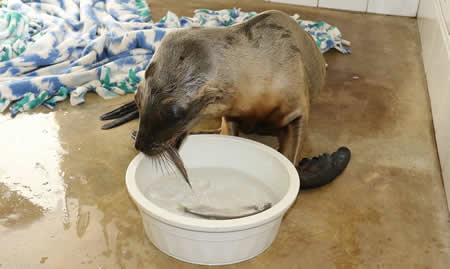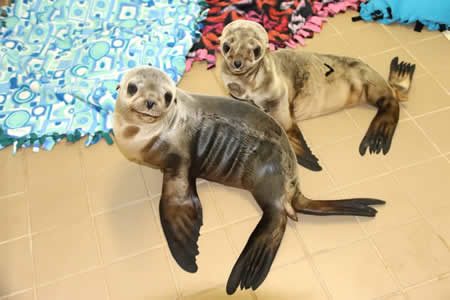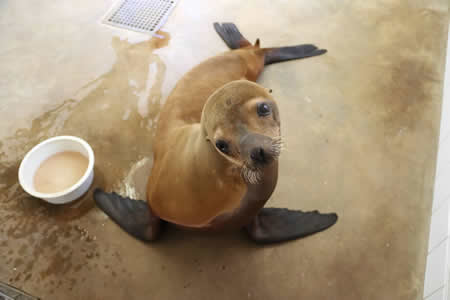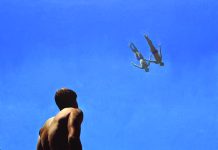By Rita Robinson | LB Indy

With already 14 sea lions rescued in the first 13 days of January, the Pacific Marine Mammal Center in Laguna Canyon is gearing up for another record year in rescues, says an announcement by the center. Last year, there were only two rescues during this time.
The rescued sea lions are emaciated and dehydrated and most are pups, said spokeswoman Michele Hunter. Their condition is similar to that of two years ago when the center rescued more than 200 starving pups. The rehabilitation facility on Laguna Canyon Road was filled to capacity, leading federal wildlife regulators to declare an “unusual mortality event.”
So far, there have been fewer rescues this month than in January of that year, Hunter said.
Professionals from NOAA’s National Marine Fisheries Service are collaborating with PMMC animal care specialists as well as other scientists along California’s coastline to determine possible causes, says the statement. Initial speculation is that the pups lack food due to an El Nino weather pattern that creates warmer water, which moves fish to cooler waters, the center’s statement says.

Marine mammals that feed on fish, such as seals and sea lions, may be affected. Marine biologists speculate that sea lion mothers are swimming farther to find food, prematurely separating from their pups when they are foraging. Mothers may not be sustaining enough nutrients to maintain their milk supply, causing the pups to be forced to wean much earlier, the report added. Speculation continues as to why there has been such a marked increase in marine mammal strandings.
“There is also an increase in parasite infestations in the rescued sea lions,” said Kirsten Sedlick, the center’s animal care supervisor. The majority are pups or yearlings, animals too young to yet understand the dangers of the oceans and do not have a fully developed immune system to fight off more severe infections.
According to NOAA’s El Niño Portal, there is an approximate 50 to 60 percent chance of El Niño conditions during the next two months.
Each year, PMMC treats from 200 to 300 marine mammals in need of medical attention, according to the center. Most of the center’s patients suffer from malnutrition or illness such as pneumonia.

So far this year, PMMC has also seen an increase in adult sea lion rescues needing medical care. “We are concerned and preparing for another very busy season,” executive director Keith Matassa said in the statement.
The center, which depends on donations to pay for food, medicine, staff and transportation, is the only organization in the county licensed to rescue and rehabilitate marine mammals.
If the public sees a stranded sea lion, call the PMMC Rescue team at (949) 494-3050. Don’t approach or feed the animal, but if possible, center staff asks that a photo be sent so they can make an informal assessment.





It’s the radiation!
Did none of the people sourced in the article really not even mention Fukushima (Japan’s nuclear meltdowns) radiation as the possible cause?
See all of these articles regarding sea-life deaths in the Pacific Ocean since 80% of the radiation from Japan’s 3 nuclear meltdowns fell into the Pacific Ocean—>
http://enenews.com/?s=pacific+ocean
Many researchers agree that even minute (tiny) amounts of this radiation is dangerous to life and DNA.
Also please be aware that Japan continues to dump dangerously radioactive water into the Pacific Ocean where it has been detected on the west coast of California.
[…] Laguna Beach Independent, Jan 19, 2015: So far this year, [the Pacific Marine Mammal Center] has also seen an increase in adult sea lion rescues needing medical care. “We are concerned”… executive director Keith Matassa said. […]
[…] seven pools at the center, the county’s only marine mammal rescue center. Currently, 125 mostly malnourished sea lions are in the center’s care, Keith Matassa, the center’s executive director, said Tuesday. More […]
[…] already decided to demonstrate their commitment to marine preservation by getting involved with the Pacific Marine Mammal Center in Laguna Beach. “We thought it would be a fun family activity,” Kim said. Setting up […]